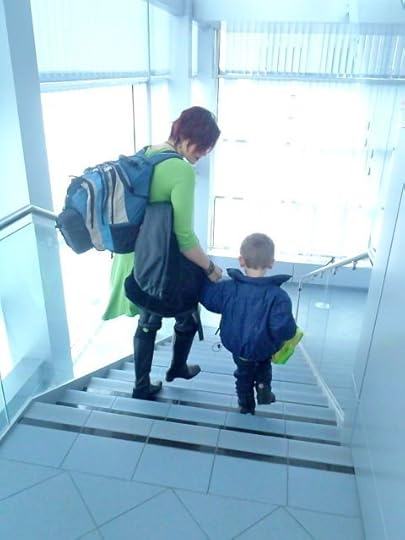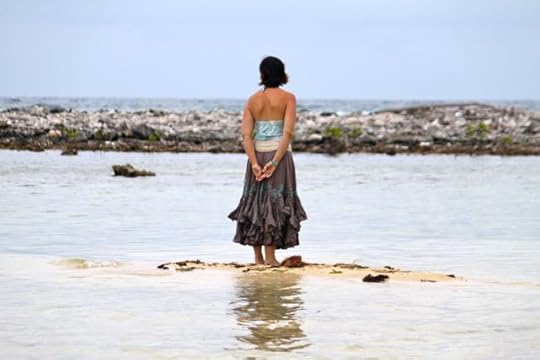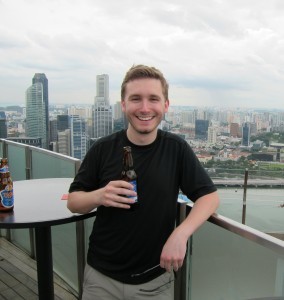Rolf Potts's Blog, page 68
February 12, 2013
Child Free Flights: How the childless can be less of a pain in the… rear.
Vagablogging :: Rolf Potts Vagabonding Blog
Air Asia has just announced that that they will be offering child-free quiet zones on some of their flights. As someone well out of the baby-toting years of parenthood, I can see how this will be appreciated by the many folks on flights who don’t have toddlers and don’t “hear the music” as my husband puts it.
I don’t enjoy ill-behaved children. As a parent, however, I realize that it’s a bit more complicated than it appears to the casual observer to keep a kid sane, happy and socially acceptable on a 30 hour marathon around the world. I’m not opposed to a few rows of “quiet seating” as it does more than isolate the childless from the irritating child, it isolates the irritating adults from the parents who are doing their level best, with more or less success, depending on the flight.
We can all agree that parents should do their best to make sure their kids are cooperative on a flight. But the flip side of that is that people traveling without young children (which is most of us, frankly) could really stand to work a bit harder at not being a pain in the ass and perhaps even stretching so far as to be part of the solution.
We were all children once, and someone extended extra grace to us on hard days, could we not do the same?
Could we not give haggard parents the benefit of the doubt? Trust me, no one is more invested in that child’s happiness than the parent.
Would it be the end of the world for us to, perhaps, say an encouraging word to the parent, instead of shoot a dirty look?
Here’s a revolutionary thought? Why carry a little package of wikki stix in your carry-on, to share with a kid who is just about at the end of his rope? Or maybe a some crayons, or a booklet of stickers?
Would that be too much to ask?
Quiet-zones on flights are one part of the solution, but another part is treating children like people, not pets, and remembering what it was like to be little and out of control of your environment. Why not be a blessing to a struggling parent instead of one more critic, and find a way to be part of the solution?
It’s just good karma.
Original article can be found here: Child Free Flights: How the childless can be less of a pain in the… rear.
February 11, 2013
Being our own example
Vagablogging :: Rolf Potts Vagabonding Blog
“You’re crazy,” one of my high school students told me one day. “I call you my crazy teacher.”
“Why’s that?” I asked.
“Because nobody actually does what you’re doing!” she replied. “I mean – people talk about riding a bike around the world, but nobody ever actually does it!”
I supposed she was right – we weren’t exactly choosing a well-worn path through life. Most people chose to live in a house with a yard and a bunch of cars in the driveway, but we decided to go our own way. We sold or stored nearly every physical possession we owned and reduced our belongings down to what would fit on three bicycles. Three bicycles worth of stuff for the next three years. Maybe we were crazy after all.
It would be a 17,300-mile bike ride from the Arctic Ocean to the tip of South America. That’s a long way on a bicycle!
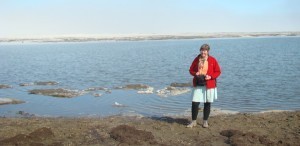
Arctic Ocean
But as I stood there on the shores of the Arctic Ocean and looked ahead at the road that would take us southward, I couldn’t help but feel they were the crazy ones. The journey ahead could only be magical – how could it not be when the four of us were together exploring our planet? Yes, we would struggle over passes and collapse into bed at the end of many long days on the road, but we would be living. Truly living. Was that really crazy?
Yet I still had to consider the fact that my husband, John, and I were about to attempt a feat that had never been done – bike the Alaskan Dalton Highway with ten-year-old twins. Originally built in the 1970s as a supply road for the oil fields of the north slope on the shores of the Arctic Ocean, the Dalton Highway had long been known as one of the most challenging bicycle routes in the nation due to its rough conditions and sheer remoteness. It would be many miles of nothing more than dirt track meandering through pristine Alaskan territory. Maybe there was a reason it had never been tackled with kids. Maybe we should get back on the plane and leave it that way.
My mind came back to the look on my sons’ faces – that look of sheer determination and excitement when they talked about the journey. They were so determined, so resolute in their desire to cycle from Prudhoe Bay, Alaska to Ushuaia, Argentina. I owed it to them to at least allow them to try. If we failed, we would fail trying.
I surveyed the enormous pile of gear strewn about our feet in the warehouse of the Arctic Caribou Inn in Prudhoe Bay and wondered, once again, if we had planned well enough. Adequate rain gear? Check. Appropriate warm clothing? Check. Tent, sleeping bags, and stove? Check, check, check. Sufficient food? Maybe check. We had planned the best we could. Now, only time would tell if we had done it well enough.
“For the record,” an oil worker said as he picked his way through our piles, “I drive this road on a regular basis, and I think you’re nuts.”
“I think you may be right,” I retorted as I glanced out the window at the road we were about to tackle.
John and I, along with our sons Davy and Daryl, had arrived in Prudhoe Bay the day before. Now, the boys were out throwing rocks at icebergs floating in the nearby lake while John and I attempted to sort our massive piles of gear.
In the next few hours we piled our gear and more than fifty pounds of food on our bikes. We were about to pedal from the northernmost terminus of the Pan-American Highway on the shores of the Arctic Ocean to Fairbanks 500 miles away. And beyond that? We would keep our bike tires pointed south until we could go no farther – at the southern tip of South America. At least that was the plan.
Even after so many months of planning, preparing, stewing, fretting, and organizing, I wondered if we would actually make it. Could we actually make it? The odds were against us – how many ten-year-old kids had ever cycled the Dalton? None. The Alaska Highway? None. The Pan American? None. We were drawing blanks as far as examples to lean on. We would have to be our own example.
Nancy Sathre-Vogel is a long-time schoolteacher who made the decision to live a life less ordinary. After spending a total of four years traveling 27,000 miles throughout the Americas with her family, she now lives in Boise, Idaho living a different sort of adventure. Changing Gears, her book about her experiences on the road, will be released in March. It is available for presale here. This post is an excerpt from the book.
Original article can be found here: Being our own example
Marcus’ farewell gift to you: Japan budget travel tips (video)
Vagablogging :: Rolf Potts Vagabonding Blog
Hey guys, after writing over 200 blog posts in 5 years, I’ll be leaving vagablogging. It’s been an awesome ride. I still remember getting excited at seeing the “Call to Writers” back in 2008 and applying. Totally thought my “Marcus Goes Global” blog wouldn’t qualify me, so I was pleasantly surprised to get the e-mail that I would become a Vagablogging writer.
As a farewell gift, I wanted to share with you my best Japan budget travel tips. Japan is an incredibly cool place. It’s ultra high-tech, yet also wonderfully traditional. Japanese pop culture is a global export, with anime, manga comics, and cuisine.
However, the big drawback is that Japan is notoriously expensive. Luckily, there are ways to save hundreds, even thousands of dollars off your trip. Just scheduling the dates of your flight correctly and buying a little-known type of Japan rail pass can be worth a bundle. If you can’t see the video, here is the link: Japan Travel Guide – Budget Tips.
The video is for my newest project, Street Smart Traveler. Lately, I’ve become fascinated with the “travel hacking” community. These are people who are obsessed with earning frequent flyer miles, like the George Clooney character in the movie “Up in the Air.”
I started up Street Smart Traveler as a frequent flyer news website to help keep track of all the cool tricks people were sharing. Through my videos, I’ll talk about broader topics like travel tips, living abroad as an expat, and international business. If these sound interesting, you can join me there. Here’s the link again: Street Smart Traveler.
Original article can be found here: Marcus’ farewell gift to you: Japan budget travel tips (video)
February 10, 2013
Travel is about leaving customary routines for new rhythms and rituals
Vagablogging :: Rolf Potts Vagabonding Blog
“The image of traveler depends not on power, but on motion, on a willingness to go into different worlds, use different idioms, and understand a variety of disguises, masks, and rhetorics. Travelers must suspend the claim of customary routine in order to live in new rhythms and rituals. Most of all, and most unlike the potentate who must guard only one place and defend its frontiers, the traveler crosses over, traverses territory, and abandons fixed positions, all the time. To do this with dedication and love as well as a realistic sense of the terrain is, I believe, a kind of academic freedom at its highest, since one of its main features is that you can leave authority and dogma to the potentate. You will have other things to think about and enjoy than merely yourself and your domain, and those other things are far more impressive, far more worthy of study and respect than self-adulation and uncritical self-appreciation.”
–Edward W. Said, “Identity, Authority, and Freedom: The Potentate and the Traveler” (1994)
Original article can be found here: Travel is about leaving customary routines for new rhythms and rituals
February 7, 2013
Motorbiking helps long term vagabonding city dwellers
Vagablogging :: Rolf Potts Vagabonding Blog
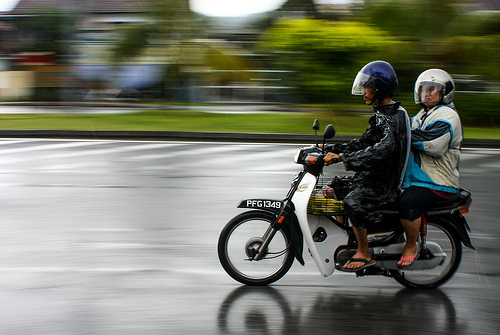
Picture credit: Flickr/Alfred Glickman
After I read this article about motorbike travel in Indonesia, I started thinking of my own experiences: I switched the focus from great memories of incredible biking trips around Southeast Asia and India, and I considered my actual situation. I concluded that I could not lead the same comfortable life if it wasn’t for an old rattler of a motorbike I am driving around Penang Island since 2010.
To be honest, when I tell my foreign friends that I use a motorbike to get around town, I am confronted with skeptical stares: ”Oh man. That is dangerous.” And I do not blame them: the vision of rush hour traffic in most Asian cities may discourage the most hardcore city driver from hitting the road, and inspire safer options such as public transport or taxis. However, I think that by committing to learn how to handle the traffic, the long-term traveler can really increase his chances to blend in with the local city hustle.
Before I used the bike, I had to ask my girlfriend for rides, or use the erratic public transportation: this last option would have been ok if the buses showed up at the expected time. And when borrowing her car, parking was always a problem. One of the occasional perks was to get stuck in traffic at 32 Celsius degrees for longer than I had ever wished for.
I needed to get back my freedom of movements and time, and put both of them to greater use than to improve the art of cursing the next approaching driver. I decided to try to do what the locals did: so many of them were zooming past me blocked in traffic, wedging with dexterity among the oppressing lines of cars. It looked like the perfect solution to speed up my days, and possibly have some fun doing it.
When I managed to get to try an old bike lent by a good friend, the first time on the Asian road was quite scary: I rode slowly at the outer side of the road, carefully watching for every approaching car and trying not to get pushed on the sidewalk by the multitude of moving things on all sides. But as my initial clumsiness transformed into a growing security, I noticed a series of great life improvements.
Time management: For sure, by riding a motorbike I was able to cut my commutes down to a fraction of the time I used traveling by car. When you sum up all the rides you may have to do in one day, you may notice that your lived life bonus increases by a few hours, and you will be very glad to be speeding on two, instead of chugging on four wheels.
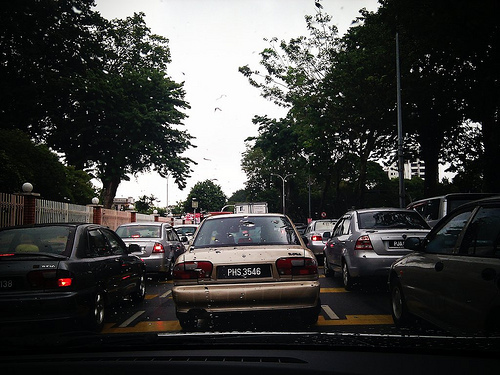
Now, do you believe that the traffic can actually be this bad? - Picture credits: Flickr/nicholaschan
Parking: Driving a car may be more comfortable and safe, but what about parking when about another thousand people want the same as you do? Parking, let me tell you, was a nightmare: sometimes finding a spot would take me almost as much time as the drive itself. Crazy, isn’t it? Even crazier when you think that you can park a motorbike almost anywhere! Some cities even have free parking spots reserved for bikes, and generally the police won’t mind if you stop for a few minutes exactly in front of the place you need to go to. No more stress, long walks, or pay for parking bills. When you add this to your time management calculations, you will find you have even more extra time on your hands.
No heat: Living in tropical countries means that sometimes your car is so hot that before you can hop in it you have to wait at least 10 minutes to cool it down. Have you ever driven a motorbike in the sun, feeling the air become fresher as you gain speed, and just enjoy every minute of it as other people have to engage with the very unhealthy air conditioning habit? Ok, if you did, you get what I mean. And… get a little more extra time on your hands.
When I do the math and sum up all the time I saved, and think of the fun I have riding the motorbike in Penang, not only I see that my days have become a couple hours – or more – longer, but I wonder why all of the other people keep driving cars. Do not tell me that it is to transport things, as if you pay attention, people around here can carry so many improbable loads on their bikes that I conclude, it is just a matter of style. Choose the easy one for yourself, and use the extra time you gain to actually do more in your daily life abroad and TRAVEL. Being stuck in a car it is traveling with the worst part of your grumpy self.
MARCO FERRARESE explored 50 countries and lives in Penang, Malaysia since 2009. He is currently a PhD candidate at Monash University’s Sunway Campus, Kuala Lumpur, researching the anthropology of punk rock and heavy metal in Southeast Asia. Besides his academic endeavors, he blogs about overland Asian travel and extreme music in Asia at www.monkeyrockworld.com
Original article can be found here: Motorbiking helps long term vagabonding city dwellers
February 6, 2013
Vagablogging Field Report: Superbowl Sunday San Francisco
Vagablogging :: Rolf Potts Vagabonding Blog
Cost/day: $50-70 a day
What’s the strangest thing you’ve seen lately?
The collective depression of San Francisco’s denizens after their beloved 49’ers lost a thrilling Superbowl against the Baltimore Raven’s was a strange and unfortunate phenomenon to witness. Red-clad, boozed and bleary eyed folk sat in the few bars that bothered to stay open, mumbling incoherently to themselves and shaking their heads. It was a painful loss, given that the 9’ers had responded to a first half spanking and a 35 minute power outage by surging back and, very nearly, pulling off a preposterous comeback. But it wasn’t to be and, instead of partying in the delirium of a win, the city grumbled, cried, drank heavily and then went to bed early.
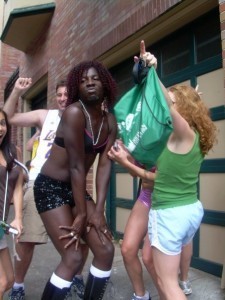
Impromptu sidewalk dance party. Not that strange in San Fran.
Describe a typical day:
Superbowl Sunday was anything but a typical day in San Fran, however I’ve been to the city many times before. Usually I begin my day in downtown and walk north up Powell past trendy clothes shops into Chinatown. I brave the abrasive nature of the Chinese lady behind the counter at Good Mon Kok Bakery and order some pork buns and shrimp dumplings. Stuffing my face, I sit in a nearby park inhabited by couple of diminutive Chinese elders who sit on benches whilst they feed the pigeons.
Numerous hills allow vistas across the city and the bay so walking is never dull. I continue north into North Beach for a coffee at Cafe Trieste. My ambling often takes me past strange characters. People dressed in outrageous clothes (think mankini), a homeless man doing a headstand on the sidewalk or a street performer using a plain old bucket as a drum. Strange figures are part of the normal fauna in SF.
After a coffee I continue down to tacky Pier 39 to laugh at the sea lions groan, fart and fight as they bask in the sunshine. If I’m lucky the street performer ‘Tree Man’ (I’ve no idea if this is his actual title) will be sitting on a milk crate with a couple of tree branches held in front of his face. Disguised as regular foliage he surprises unsuspecting tourists walking along by swiftly removing the branches away from his mug and shrieking at them. They shit themselves and the small crowd gathered around watching laughs heartily. Mission accomplished. Tree Man appears to derive no enjoyment from his day job. When the tourists startle he just sits there stone faced. I guess he’s just scared too many people.
I continue along the Embarcadero past hard bodied fitness freaks going for their daily jogs. I eat an organic, vegan something or rather in the Ferry Building. The options for the afternoon are numerous. Perhaps I’ll rent a bicycle and ride over the Golden Gate Bridge. Maybe take a bus to the Golden Gate Park and visit the Calfornia Academy of Sciences, de Young Museum or simply lay in the grass enjoying the lush surrounds and scent of marijuana that always seems to permeate the area.
I walk up to Clement street for dinner and eat at one of my faves, either Burma Superstar or King of Thai (one). If I’m feeling up to it after dinner I may head to a bar along Polk, Union or the Mission to down a couple of Anchor Steams.
It’s hard not to love this city.
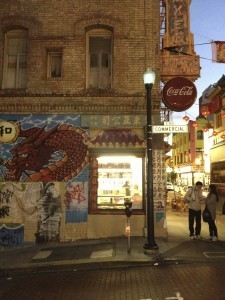
Chinatown. There is some Banksy art under there somewhere
Describe an interesting conversation you had with a local:
As we caught up over a couple of beers my friend Kaylo told me about her job at an organic baby food start up. I couldn’t possibly think of a company more likely to be based in the Bay Area. The city and it’s surrounds have long been a hub for tech, organic and entertainment start ups. Some people may scoff at the hippy vision of SF, however there is a palpable creative zest here and a shared excitement that everyone is trying to do something new and innovative to improve the world.
What do you like about where you are? Dislike?
I love SF’s weird energy, variety of entertainment options (sport, comedy, live bands, awful poetry) and sublime food. These factors are enough to keep me coming back again and again. It helps that the weather is pleasant in winter and the accessible public transport (a rarity in US cities) makes it a cinch to get around.
SF has an overabundance of homeless people. I hate seeing people live in squalor, particularly in such an affluent part of the nation. I’m not overly fond of being hassled for money constantly either. The people that find themselves on the streets are not just lazy bums but, more often than not, afflicted by mental illness and/or drug problems. It’s far from an easy problem to fix, however access to better mental health care would certainly be a start.
There’s no denying that San Fran is an incredible city, however it’s tiresome when you’re constantly being told how much better it is than other cities. It’s quite common for a local to profess their undying love of the city by the bay prior to their eyes glossing over when I mention other cities I’ve lived in or visited. Obviously there are other cities in the world worthy of praise, but some people are blinded by their infatuation. Whenever I find myself in one of these conversations I think of South Parks take on this perceived elitism.
Describe a challenge you faced:
I didn’t face any challenges this time around. Dealing with the crestfallen locals was unusual but not necessarily a challenge. It’s refreshing after several months of travel in unfamiliar destinations to find myself in a place that I know fairly well.
What new lesson did you learn?
I love SF but I wouldn’t want to live there. Even though it’s a relatively small city I find it a bit too busy and the homelessness problem really gets to me. Perhaps I’m a 97 year old trapped in a 27 year old’s body or it might be that I’ve reached a new level or assholery. Either way this is how I feel, but I’ll always be happy to visit.
Where next?
Back home to Australia after 11 months of travel
Were you in SF for Superbowl Sunday? What was your experience? How do my thoughts on this wonderful city compare to yours? Feel free to post comments below.
You can follow me on twitter @ash_jordan and instagram @ashgjordan
Original article can be found here: Vagablogging Field Report: Superbowl Sunday San Francisco
February 5, 2013
Mental Munchies: Thoughts to chew on while you travel
Vagablogging :: Rolf Potts Vagabonding Blog
I’ve been spending a lot of time uncomfortable in Indonesia this month. I confess to being a bit burnt out, a bit gritchy about the things I generally have a sense of humor about (taxi drivers and touts at the top of the list). We flew to Bali for some R&R and to eat our weight in salad for a week or so. It’s helping.
I’ve been on the road long enough to know that there are cycles, as with any other life. There are times of wonder and wild enthusiasm. There are doldrums. There are storms and seasons of discontent too. It’s all part of the journey, and when I’m discontent, I’m learning that it’s a time to look inward, and ask some fundamental questions about why: it’s almost always on the inside, not the externals.
The other thing I’ve learned is that the antidote is often to feed my mind and water my soul with big thoughts and deep questions. Here are a few of the quotes I’ve been chewing on this week as I seek to turn the tide of my current discontent:
“When we get out of the glass bottle of our ego and when we escape like the squirrels in the cage of our personality and get into the forest again, we shall shiver with cold and fright. But things will happen to us so that we don’t know ourselves. Cool, unlying life will rush in.” – D.H. Lawrence
“A journey is like marriage. The certain way to be wrong is to think you control it.” – John Steinbeck
“What you’ve done becomes the judge of what you’re going to do – especially in other people’s minds. When you’re traveling, you are what you are right there and then. People don’t have your past to hold against you. No yesterdays on the road.” William Least Heat Moon
“I travel light. I think the most important thing is to be in a good mood and enjoy life, wherever you are.” — Diane von Furstenberg
It isn’t the mountain ahead that wears you out; it’s the grain of sand in your shoe. — Robert W. Service
Original article can be found here: Mental Munchies: Thoughts to chew on while you travel
February 3, 2013
We often behave abroad in ways we would never permit at home
Vagablogging :: Rolf Potts Vagabonding Blog
“We have an unceasing capacity to make ourselves nuisances, basically. Students of tourism science can and do construct elaborate theories from physics, of course, invoking such wizards as Heisenberg and the Hawthorne effect and the status of Schrödinger’s cat to explain the complex interactions between our status as tourist-observers and the changes we prompt in the peoples and places we go off to observe. But at its base is the simple fact that in so many instances, we simply behave abroad in manners we would never permit at home: we impose, we interfere, we condescend, we breach codes, we reveal secrets. And by doing so we leave behind much more than footfalls. We leave bruised feelings, bad taste, hurt, long memories.”
–Simon Winchester, “Take Nothing, Leave Nothing,” Lapham’s Quarterly, Summer 2009
Original article can be found here: We often behave abroad in ways we would never permit at home
Travel writers: Matthew Kepnes
Vagablogging :: Rolf Potts Vagabonding Blog
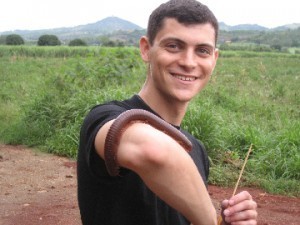 Matthew Kepnes is the author of How to Travel the World on $50 a Day: Travel Cheaper, Longer, Smarter
Matthew Kepnes is the author of How to Travel the World on $50 a Day: Travel Cheaper, Longer, Smarter , which debuts in bookstores this week. He runs the award winning budget travel site, Nomadic Matt, and his travel advice has been featured in the New York Times, CNN, The Guardian, Lifehacker, Budget Travel, BBC, Yahoo! Finance and countless other magazines. He is also a regular speaker at travel trade and consumer shows. When not traveling the world, he spends his time in New York City.
, which debuts in bookstores this week. He runs the award winning budget travel site, Nomadic Matt, and his travel advice has been featured in the New York Times, CNN, The Guardian, Lifehacker, Budget Travel, BBC, Yahoo! Finance and countless other magazines. He is also a regular speaker at travel trade and consumer shows. When not traveling the world, he spends his time in New York City.
How did you get started traveling?
I did a tour around Costa Rica in 2003. From that moment on, I was hooked on travel. I couldn’t believe I had waited so long to travel. That trip profoundly changed my life and realizing what I was missing out on, I vowed to do it more often. After that the rest is history.
How did you get started writing?
I wanted to write guidebooks for Lonely Planet so I created my website to be an online resume where they could see my writing and previous work. However, as the site got bigger, I became a walking guidebook in some ways and now my site is all the writing I do.
What do you consider your first “break” as a writer?
I would say it was in 2009 when I was interviewed by the Frugal Traveler column in the New York Times. It was a big event and completely changed everything.
As a traveler and fact/story gatherer, what is your biggest challenge on the road?
As a writer the hardest part is running around gathering all the information you need for an article. I try to be very thorough so much my time is divided between actually enjoying the location and running around getting prices, checking on passes, and finding deals for other travelers. I don’t want to miss anything so my time in new locations is very hectic.
What is your biggest challenge in the research and writing process?
Managing time. It’s hard to always be traveling and writing at the same time. I can’t be out exploring if I am in my hotel writing but I have nothing to write about if I’m not out exploring.
What is your biggest challenge from a business standpoint?
Find a way to bring in consistent revenue. While my blog is monetarily successful, it takes a lot of work to maintain my income level and it’s hard to find ways to bring in the money easily and consistently. It’s often a hustle.
Have you ever done other work to make ends meet?
No, I had another job when I started this website so when the website finally started making money, I just left that job to focus on the blog.
What travel authors or books might you recommend and/or have influenced you?
Bill Bryson is a huge influence. His book In a Sunburned Country was big influence on me. Your book, Vagabonding, was important in preparing for my first trip around the world. Other writers I like include Chuck Thompson, Don George, and Pico Iyer.
was big influence on me. Your book, Vagabonding, was important in preparing for my first trip around the world. Other writers I like include Chuck Thompson, Don George, and Pico Iyer.
What advice and/or warnings would you give to someone who is considering going into travel writing?
Be focused. There are plenty of “experts” out there but really the best of them are ones you focus on one area. Travel is too encompassing of a term. You can’t be a “travel expert” but you can be an expert on a type of travel or a destination. Focus on that and you will see much better success.
What is the biggest reward of life as a travel writer?
Being able to set my own schedule and being my own boss. I get to do what I love (travel) and get paid to do it all while being able to live life at my own pace and on my own schedule.
Original article can be found here: Travel writers: Matthew Kepnes
February 1, 2013
Vagabonding Case Study: Todd Stine
Vagablogging :: Rolf Potts Vagabonding Blog
Todd Stine
Age: 28
Hometown: McLean, Virginia
Quote: “The biggest lesson I’ve learned is that most people are incredibly friendly and beyond helpful, often when you need it the most.”
How did you find out about Vagabonding, and how did you find it useful before and during the trip?
I stumbled upon Rolf Potts’ Vagabonding in the travel section of a local bookstore nearly 5 years ago. At the time I realized that I really didn’t have anything holding me back from international travel and ‘Vagabonding’, in a way, gave me the courage to do my first short-term solo trip to Portugal. Afterwards I immediately had the itch to do a more substantial RTW style trip. It took a year or two and a friend getting laid off with similar travel desires to finally get the initiative to put the career on hold and take the leap.
How long were you on the road?
I’m currently near the end in Month 3 of what will be probably a 7 – 8 month trip.
Where all did you go?
This trip started down the west coast of the United States and on to Hawaii. Then to Sydney, Australia and I worked my way up the coast to Brisbane. A flight to Singapore, then overland (mostly train) travel through Malaysia, Thailand, Cambodia and Vietnam. Followed by flights to India, Egypt and Turkey. Since the trip is a little under half way done my next planned stops are Prague and probably Spain. I’ve learned some of the best travel is unplanned travel.
What was your job or source of travel funding for this journey?
I’ve had a full time career since I left high school. My bachelor’s degree was completed on nights and weekends. Ten remarkably fast years later and I was a Project Manager for an IT company, saving money for my “adult life”. Once I got the itch to travel, I realized that I had saved more than enough to sustain a year abroad and had no valid reason not to do it. Luckily my company was nice enough to offer me a leave of absence while I complete this trip.
Did you work or volunteer on the road?
No, however I’m not ruling out some work/volunteering for accommodations later on.
Of all the places you visited, which was your favorite?
Cambodia. The people of Cambodia are easily the most welcoming and friendly people I’ve ever encountered. From the moment we arrived, every hostel and person treated us like family and often I would find myself sharing a beer or food with their actual family. My time in Cambodia felt more like I was an invited guest in someone’s home over being a tourist.
Was there a place that was your least favorite, or most disappointing, or most challenging?
Bangkok, Thailand was probably my least favorite of places I’ve traveled. We discovered that we arrived in Bangkok about a week and a half out from Songkran (Thai New Year), which is celebrated by a city-wide public water fight. Naturally after hearing a few stories of the craziness, we wanted to be right in the middle of it. I found Bangkok to be a place that wears on you though. There are some great sights, amazing food, good night life… but along with that comes a certain level of accepted seediness. Having unknowingly stayed on a few streets which are almost entirely dedicated to sex tourism, after being there for a week and half, the city just started to feel gross. In the end being in the city for Songkran made the excessive time spent in the city worth it. How could you not enjoy running around a city with a water gun, drenching both locals and tourists?
However, the most challenging place was India by far. Arriving late at night and not being totally prepared for how well orchestrated some of the scams could be it was a long first night. But in the end some helpful drivers navigated us through everything and by the end of our time in India it turned out to be one of the most rewarding countries I’ve traveled to.
Did any of your pre-trip worries or concerns come true? Did you run into any problems or obstacles that you hadn’t anticipated?
Absolutely. Getting food poisoning in Cairo was one of obvious the low points of the trip.
Which travel gear proved most useful? Least useful?
The most useful gear I brought was my recently purchased iPod Touch. After deciding that I wasn’t bringing a cell phone, it’s been a much needed savior. From being able to show directions to your hostel to tuk-tuk drivers to being able to read from the Kindle App on a 16 hour train ride from Saigon to Hoi An; it has been indispensable.
What are the rewards of the vagabonding lifestyle?
I feel like vagabonding certainly changes your personality if you’re willing to let it. Experiencing different cultures first hand alters your perspectives on the world and, well, everything. Learning about the history and immense struggles of people around the world can dramatically alter how you view your own life and the struggles you’ve endured. For me traveling is as much about seeing the sights as it is about meeting local people and experiencing their culture and life. And thankfully, I’ve had plenty of experiences on this trip that will resonate with me forever. Being able to help and experience a day in the life of an impoverished family in a rural village in Cambodia was both eye opening and amazing rewarding. Our driver in India inviting us into his home as friends to share dinner with his family showed me what the definition of true generosity is. If you are open to change, it’s hard not to while traveling.
What are the challenges and sacrifices of the vagabonding lifestyle?
Being away from friends and family can be tough, but Skype and email these days is a life saver. The fact that I could be there in some regard for holidays and birthdays went a long way.
What lessons did you learn on the road?
The biggest lesson I’ve learned is that most people are incredibly friendly and beyond helpful, often when you need it the most. Before you go into an area you’ll read about dozens of scams and of people just waiting to prey on and exploit ignorant travelers. And I assure that they exist, but for every person ready to scam you there are dozen people willing to help you if you’re lost, talk to you if you are sitting alone in a restaurant, and give you advice without prompt. I’ve been on long train rides with no local money and the person in the next seat generously bought a dinner for me without thinking twice. All across the world people are generally good.
How did your personal definition of “vagabonding” develop over the course of the trip?
The first thing I realized was that traveling is different from person to person. Some are trying to save every dollar, while others are eating out at every meal. Both sides can be equally rewarding though and finding out what comfort level of travel fits your needs will go a long way. Your travel should be for your own personal reasons and experiences and not for other people (whether to impress or otherwise).
If there was one thing you could have told yourself before the trip, what would it be?
Don’t be afraid to let the trip be defined as you go. Being spontaneous and in the moment is half of the fun.
Any advice or tips for someone hoping to embark on a similar adventure?
First and foremost if you are interested in traveling, do it. Take whatever leave you have at your job, pick a place you’ve always wanted to go or maybe just don’t know anything about, and go there for a week or two. Odds are you’ll realize just how easy and rewarding travel can be and start planning your next trip. Maybe it won’t be a year long trip but it’ll be a start.
When and where do you think you’ll take your next long-term journey?
Since I’m only a little over the halfway mark with this trip, I have some time before I’ll take my next one. But that’s not to say I’m not already thinking about countries I’ve missed on this trip or adventures I want to add. Trekking in Nepal, exploring South America, and stepping foot on Antarctica are probably going to be the focus of some of my next travel endeavors.
Website: www.toddgoesplaces.com
Are you a Vagabonding reader planning, in the middle of, or returning from a journey? Would you like your travel blog or website to be featured on Vagabonding Case Studies? If so, drop us a line at casestudies@vagabonding.net and tell us a little about yourself.
Original article can be found here: Vagabonding Case Study: Todd Stine
Rolf Potts's Blog
- Rolf Potts's profile
- 323 followers


